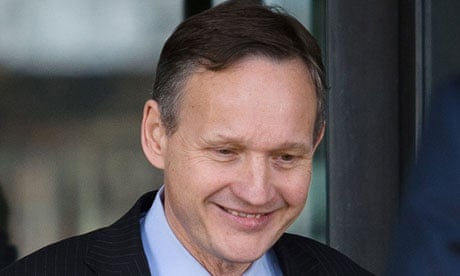The new chief executive of Barclays is to close the bank's controversial tax avoidance unit in a bid to repair its battered reputation, although he still risks inflaming the row over City pay by paying out up to £2bn in bonuses.
Antony Jenkins, who took over as Barclays boss when Bob Diamond was forced out as a result of the Libor-rigging scandal, will announce on Tuesday that the tax planning part of the structured capital markets (SCM) division – which has been accused of orchestrating tax avoidance on an "industrial scale" and has generated vast profits for the bank – is to be axed.
The tax planning operation is one of several areas that have put been under review by Jenkins to assess if the bank's businesses are ethical and not just profitable. While Barclays will continue to offer straightforward tax planning to customers, it will pledge to no longer devise schemes purely intended for this purpose.
Barclays is also facing calls to restrict bonuses following the £290m Libor rigging fine; a £1bn bill for compensating customers mis-sold payment protection insurance; and a potential multi-million pound fine for mis-selling interest rate swaps to small businesses.
The Financial Services Authority and the Serious Fraud Office are also investigating the way the bank staved off a taxpayer bailout in 2008 by raising funds in the Middle East.
However, employees were told about the size of their bonuses on Friday, and when the bank publishes its 2012 results on Tuesday, it is expected to reveal that it paid out up to £2bn in bonuses.
The existence of SCM has long been controversial, including rumoured £40m pay deals for former bosses, and reports from insiders about tough management styles and odd rituals.
Lord Lawson, the former Tory chancellor, and Labour peer Lord McFall have repeatedly raised the existence of the division when Barclays witnesses have appeared before the Banking Standards Commission, set up after the Libor scandal in June.
McFall has cited reports from insiders – disputed by the bank – that the division had generated 110% of the bank's profits. When Jenkins appeared before the commission last week, Lawson accused the bank of engaging in "industrial scale" tax avoidance that while legal was unethical.
Jenkins had indicated that a restructuring of the operation was likely and when he unveils his strategy for the bank he will insist that the tax operations will close. His plan is expected to fall short of a break-up of the bank, but is likely to involve 2,000 job cuts.
Jenkins will admit that some parts of the business were engaging solely in devising tax schemes.
"There are some areas that relied on sophisticated and complex structures, where transactions were carried out with the primary objective of accessing the tax benefits," he will say.
"We will not engage in it again," he will say, because it is "incompatible" with a new commitment to pay tax. But he will insist that some areas are "not controversial" because they delivered "value as part of real client transactions".
Along with Diamond, the chairman Marcus Aguis and chief operating officer Jerry del Missier have quit, while finance director Chris Lucas and legal counsel Mark Harding signalled their departures last week. Question marks remain over Rich Ricci who runs the investment bank.
